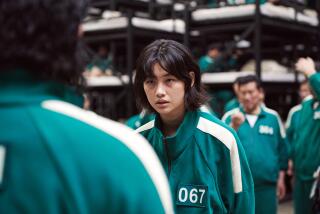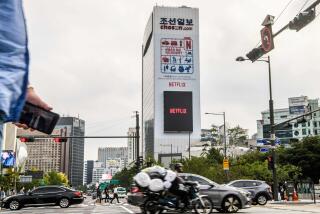Dispute Continues Over Right to Distribute Movies in Korea
- Share via
SEOUL, South Korea — The latest efforts to settle a dispute over the right of U.S. movie makers to distribute films here directly has still not cleared the air.
The first film company to attempt to exercise the right--Universal International Pictures, a distributor jointly owned by three major Hollywood studios--will try again Jan. 1. But Mike S. Pae, the distributor’s general manager here, said initial tests of the Oct. 28 agreement offered little cause for optimism.
Since U.S. Trade Representative Clayton K. Yeutter announced the settlement--and the Motion Picture Export Assn. of America accordingly withdrew a complaint against South Korea for alleged unfair trade practices--Universal International has been hit with a new round of demonstrations, forced to go to Hong Kong to have its movies subtitled and had six major Korean newspapers reject its advertisements.
The firm’s first film, “Fatal Attraction,” closed a disastrous seven-week run Saturday at the last of eight theaters that braved demonstrations, violence and harassment--including snakes placed in two of the theaters. A day before the run ended, five screenings attracted a total of 286 people.
Now, Pae said, Universal International is looking forward to a much needed “cooling off” before showing “The Living Daylights,” starring Timothy Dalton as British secret agent James Bond, at 12 movie houses in 10 cities beginning New Year’s Day.
Firm bookings, however, have yet to be obtained, he admitted.
“We’ll do our best to solve the problems (before New Year’s),” said Pae, adding, “I hope what the Korean government promised Yeutter will work out.”
Although Yeutter praised the new agreement, a refinement of a 1985 settlement of an earlier dispute, the trade representative warned that he would welcome a renewed complaint if disturbances, refusals to accept newspaper ads and rejections of requests to subtitle U.S. films continued.
However, Korean producers, who until now have served as middlemen in distributing foreign films, and directors reacted by staging four days of new protests against “Fatal Attraction.”
A renewed bid by Universal International to place advertising for “Fatal Attraction” with the six major newspapers also was rejected. In a meeting on Oct. 30 with advertising directors of the Kyunghang, Dong-a, Seoul, Chosun, Hankook and Joong-ang newspapers, the firm was told that a “longer cooling off period” is needed, Pae said.
The executives of the newspapers, which themselves have been fighting to regain freedom of the press after President Roh Tae Woo promised to end years of repressive news censorship, also revealed that movie houses belonging to the Seoul Theater Assn. had threatened to withdraw all ads unless the U.S. distributor’s ads were run on separate pages from theirs, Pae said.
The newspaper executives, however, suggested that if Universal International ran bigger ads than it had requested and agreed to forgo customary discounts on film advertising, they would consider accepting “Fatal Attraction” ads, Pae said.
“That’s blackmail,” the Universal International executive charged. He said he did not respond to the demand.
During the entire seven-week run, only four economic dailies accepted “Fatal Attraction” ads, Pae said.
His company, he said, was particularly upset that one of the newspapers that rejected its ads, the Joong-ang Ilbo, is owned by the Samsung Group, which also owns the advertising firm that Universal International has hired here, the Korea First Advertising Agency.
Michael Williams-Jones, president of Universal International, a London-based joint venture of Paramount, Universal Studios, and MGM/UA Communications, wrote a letter to Lee Kun Hee, chairman of the Samsung Group, to complain about his newspaper’s ban on the “Fatal Attraction” ads but had not yet received a reply, Pae said. Samsung, a major electronics manufacturer, exports heavily to the United States, he noted.
Pae said he had given up trying to have his films subtitled in South Korea. Only one Korean company does subtitling, he said, and it has received “so many threats” that Universal International decided to have subtitling done in Hong Kong.
“It’s cheaper there, anyway,” he said.
Korean producers and directors also launched a new move against Universal International on Oct. 31 by filing a complaint of unfair trade practices with South Korea’s Fair Trade Commission. They charged that Universal International was set up as a syndicate to promote a cartel in distribution. Pae dismissed the complaint as groundless.
Pae said he plans to re-release “Fatal Attraction” next spring.
More to Read
The biggest entertainment stories
Get our big stories about Hollywood, film, television, music, arts, culture and more right in your inbox as soon as they publish.
You may occasionally receive promotional content from the Los Angeles Times.










